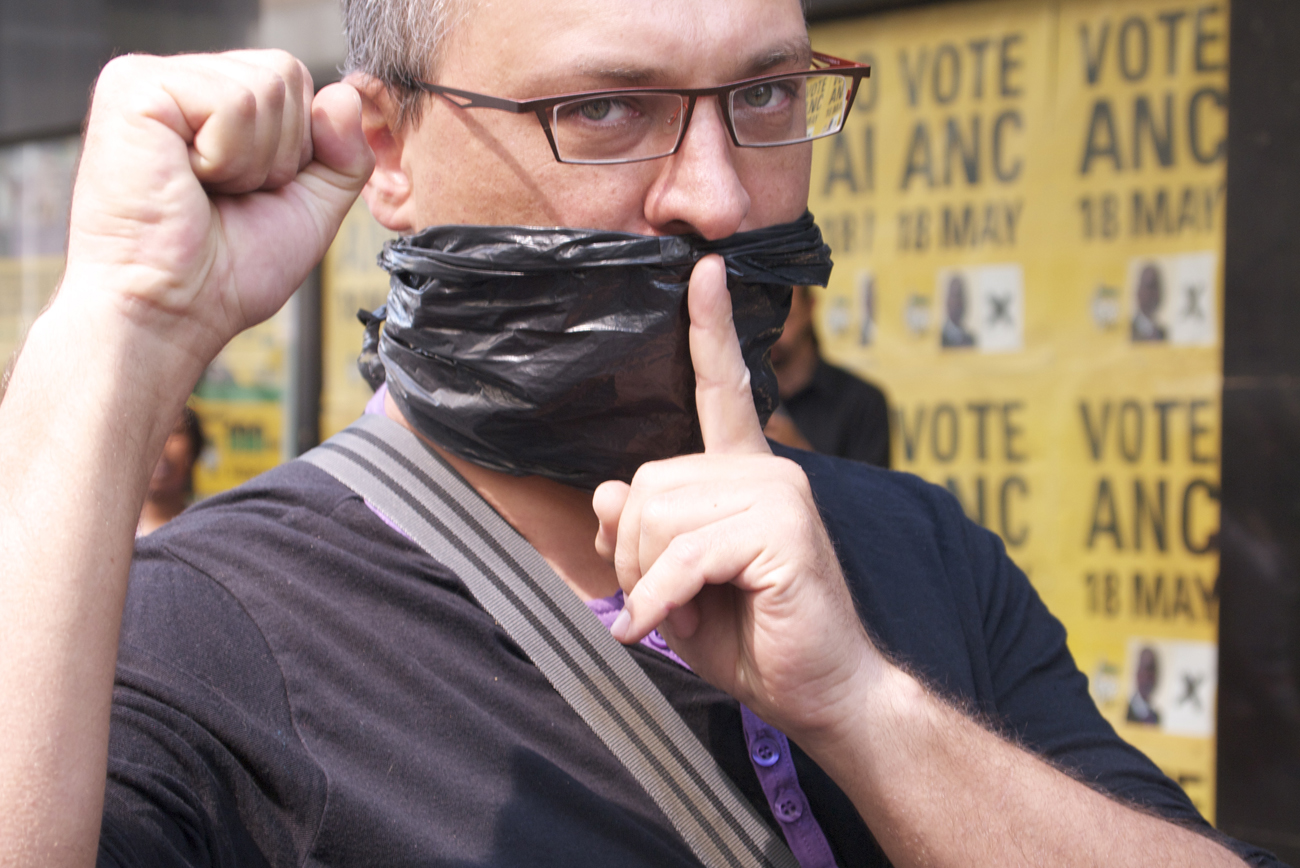One day towards the end of October 2011, Bheki Cele got out of bed and went about his business as he had done every day since he was made National Police Commissioner. Cele praised police in Mpumalanga for crime reduction efforts, addressed kids at a crèche and spent time reaching out to citizens. The police chief’s spin tour came to an abrupt end later that afternoon when President Jacob Zuma announced his suspension, and Cele walked into the history books. He was yet another ANC stalwart who had been suspended, earmarked for investigation, or rendered obsolete after being exposed by those muckrakers, the fearless investigative journalists that expose the rot of growing greed and corruption inside South Africa’s government.
It was the Sunday Times’ team of Stephan Hofstatter and Mzilikazi Wa Afrika who helped take Cele down, and as ruling party MPs used their majority to shove the Protection of State Information Bill through Parliament, it is likely the spectres of Cele, Sicelo Shiceka and Gwen Mahlangu-Nkabinde loomed large. The vote sent a clear and disturbing message to whistleblowers who aided the exit of corrupt ruling party members.
“The worst thing about the vote will be the chilling effect it has on whistleblowers,” says Hofstatter. “There are people who go to great risk to give us information. When we investigate corruption, we make a strong case and rely on insiders to provide us with evidence. Up to now the greatest fear for whistleblowers has been the dread that they might lose their jobs. We have spent a lot of time chipping away at this fear to convince people that they can provide us with evidence. Now this anxiety has moved from losing jobs to going to jail for several years.”
Hofstatter believes the ruling party vote in favour of the “secrecy bill” has been a calculated move to intimidate insiders and sources within government, the ANC and its alliance partners who provide journalists with information or documentary evidence of corruption. “The intention is to frighten insiders who help us. Right now we are talking about the trade union movement, people in senior government positions and people in senior positions in the ruling party who give us really accurate information, and who back this up with documentary evidence. It is really depressing because it is going to make it harder for these sources to give us the information and evidence we need to do solid investigative work,” says Hofstatter.
Assistant editor at City Press and author of “Finish & Klaar: Selebi's fall from Interpol to the Underworld” Adriaan Basson agrees, saying: “The biggest threat will be the impact on sources. This could easily have a chilling effect on whistleblowers who will fear coming forward with documents, particularly when they are classified.” Basson says that should the bill become law, if confidential documents land on a journalist’s desk, a reporter would be required by law to go to the nearest police station to get the document declassified. “This is untenable since often these documents implicate law enforcement officials or issues. Publishing these documents, you run the risk of being arrested. This means long consultations with lawyers – a costly affair.”
City Press has earned the ire of the ANC because of its exposés on fat-cat ruling party cadres, and the manner in which the paper has detailed the inner workings of corrupt networks in Limpopo, Mpumalanga and within the ANCYL. Other embarrassing revelations included deep insight into how suspended ANCYL leader Julius Malema’s lavish lifestyle was bankrolled, and the Mbalula sex scandal.
Undoubtedly one of the biggest thorns in the ANC’s side has been amaBhungane, the Mail & Guardian’s Centre for Investigative Journalism founded by veterans Sam Sole and Stefaans Brümmer. The amaBhungane duo have been responsible for revealing key aspects of the arms deal scandal, the Selebi affair, as well as the funding of the ANC through Chancellor House and Oilgate. Brümmer was in Parliament on Tuesday when ANC MPs did their worst. “Sjoe. It was very sad,” says the award-winning journalist.
“It was good to see that without any exception, the opposition put up a fight, as gallant as they could. Pretty much the same attitude came from the public gallery and outside with the Right2Know Campaign, media and all sorts of people protesting. I think the ANC finds itself sadly at odds, not only at with what’s good for the people, but also with what the people want. One just hopes that now the remaining few avenues that are still left to avert this, do lead to a solution,” he says.
A week ago, the Mail & Guardian took a very hard decision when it published a redacted version of a story about the now-defunct Scorpion’s investigation into presidential spokesman Mac Maharaj. The “butchered” version of the paper harkened back to an apartheid South Africa when censorship ruled supreme. “We took a tough decision not to publish last Friday in a very similar set of circumstances where we were notified that a similar clause, let’s call it the secrecy clause in the NPA Act, would criminalise our actions should we publish. On legal advice and after thinking very carefully about it, we decided not to publish, but rather live to tell the story at a different time or different way,” says Brümmer. “It is very important to get the message out, and for now to stay within the law while we challenge the law, and that is exactly what we are doing. You will find similar obstacles arriving to publication more often should the secrecy law come in place.”
Brümmer says the rush to push the secrecy bill through is likely because Mangaung (the 2012 ANC elective conference) is looming. “The ruling party is trying to protect itself against the leaking that could well occur in these internecine battles that seem to mark the succession race in the ANC.”
Andrew Trench, editor of Media24's Investigations team, says that if the bill does become law, it would make the work of investigative journalists more difficult, risky and dangerous. “The threat of prosecution now is really very real. I can think of at least one story we have done in the last two months when we had information where under this law it is very likely that our team would have faced prosecution,” says Trench.
“I am very disappointed about the vote considering the history of the country and considering where we have come from. You would have thought that some of the MPs sitting in Parliament would have shown some spine and integrity when it came down to the crunch. I think if it becomes law, we will have to take careful legal advice about how we treat particular stories. If it does become law, the race will be on to see who will be the first to be prosecuted so that the law can be put to the test,” he says, adding that Media24 would use the full weight of its resources to protect its journalists and to offer them the best media law backing.
Media24 team member and investigative journalist Julian Rademeyer believes it is not just the grand corruption exposés that will suffer, but the smaller stories that affect everyday people. “If the bill becomes law it could affect everything from tenders, to environmental impact studies, to committee reports, to the more mundane stuff that the average person needs to understand the workings of government which could be classified.”
Rademeyer adds that the bill assumes that citizens have a level of trust in politicians and state security officials which enables them to be arbiters of what information should be classified and what shouldn’t be classified. “If you look at stories like the Sunday Times’ stuff on Bheki Cele and the stories we have done on these crime intelligence units, the state security apparatus and the rot that has crept into these agencies, it is obvious they have deep set problems. These intelligence agencies are being used as some sort of political football and there are entrenched levels of corruption and incompetence. These are the people that we are supposed to be entrusting to guard state secrets.” Rademeyer says he doesn’t believe that the bill will pass constitutional muster. “I think it is pretty much doomed to failure once it gets to the Constitutional Court, hopefully it doesn’t get that far,” he says.
Barry Bateman is a journalist who deals with citizen issues on a daily basis and who has won enormous respect for the investigative work he’s done as an Eyewitness News journalist covering the Tshwane region. “What’s worrying is how the legislation will be used to classify documents, particularly those related to tender fraud,” Bateman says, adding that tender bid adjudication committees are already secretive by nature and that the bill becoming law would make it near impossible to get information on corrupt tenders.
“If the bill becomes law, the legislation could be used to make these documents even harder to get my hands on. Then there’s the question of whether I would be willing to face 25 years in jail for breaking a corruption story and possessing what could be deemed illegal documents. Will I be prepared to take that risk?” asks Bateman, who has a young family. “Journalists need to understand what it means if they push the boundaries and how to circumvent the bill if it becomes law, through legitimate means. It doesn’t mean that investigative journalism will stop, only that we will have to think a lot harder about how we will get this type of information into the public domain,” Bateman says.
Bateman’s boss Eyewitness News editor Katy Katepodis says the news team gets loads of documents that land on its doorstep begging for investigation. “If the bill becomes law, it will curb our ability to report freely, fairly, accurately. It will give politicians the excuse to classify information they don’t want to see out there in the public domain. This is going to have an effect on journalists and whistleblowers, on the people who have until now spoken to us freely. People will fear landing in jail and will think twice about whether to speak out.”
In South Africa the media have shown strong support for each other, as witnessed with the arrest of Mzilikazi Wa Afrika – the subsequent media outcry, international lobbying and his rather rapid release. Unfortunately there’s little, if any, of that kind of support for whistleblowers who are left out in the cold, or at the ruthless mercy of those who wish them away. DM
Read more:
- South Africa's assembly passes 'secrecy bill,' stirring journalists' fears' in the Christian Science Monitor;
- South African lawmakers approve 'secrecy bill' to protect state in The Guardian;
- Black Tuesday in South Africa in The New Yorker;
- South Africa to Adopt Secrecy Law That Critics Say May Stifle Graft Probes in Bloomberg.





